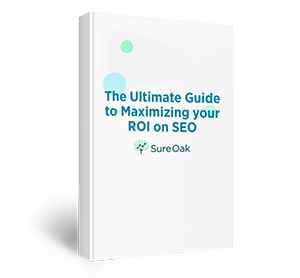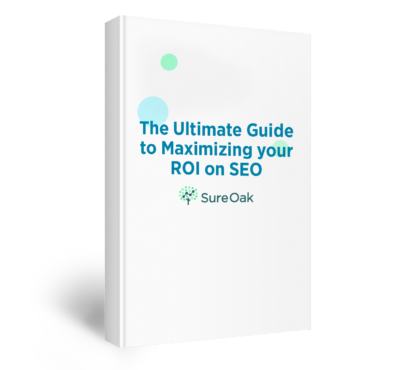High-performing websites take time to build. They take time and require ongoing work to remain competitive in the digital marketplace, and search engine optimization (SEO) is essential to your business’s future. It increases your website’s visibility, traffic, and search engine rankings — all of which drive qualified leads your way.
SEO is a long-term investment that delivers significant returns. Here’s why it works and how you can leverage it to grow today and flourish tomorrow.
Search engines aren’t going away

Search engines have become extensions of our brains. We use them to answer pressing questions such as, “Who is that actor in that one movie?” and, “How can I keep my cheesecake from cracking down the middle?”
Google alone processes more than 3.5 billion searches every day.
But we also use search engines to start most of our commercial transactions. People shop across Google more than a billion times every day. They research products and compare prices before making purchases. When looking for local business information, almost 99% of internet users turn to search engines, and more than 35% do so several times a week.
How long does it take for SEO to work?
SEO is a process that takes time to deliver results. Generally, it takes between four months and a year for SEO efforts to start showing positive results. During this period, the website must be consistently, actively monitored, and optimized to achieve the desired outcome.
So how long will it take for you to see positive results? You should answer a few other questions first.
Is the website old or new?
A website’s age can affect how long it will take for an SEO strategy to work. Generally, older websites have an easier time ranking than newer ones. This is because it takes time to get new content indexed. However, new sites do have some advantages. Newer websites can be more adaptable and tend to have well-formatted code.
Note that the website’s age differs from the domain’s age. The domain is the website’s name, and older domains typically have more authority than younger ones. The website is what people actually experience at your URL, the structure they encounter.
How competitive is your niche?
Your niche’s competitiveness will also significantly impact the amount of time it will take to see SEO results. More competitive niches are likely to take longer — there are likely to be more established websites competing for the same keywords. On the other hand, in less competitive niches, the visibility of your content should increase faster because the gap between you and the top-ranking websites will not be as wide.
Are you willing to invest the resources needed?
Investing in SEO is critical to your success. Think about the time and money you’re willing to commit. There’s often a trade-off between the two. Are you willing to allocate enough to get the job done more quickly?
Do you have sound strategy and execution ideas?
SEO is a long-term investment, and you need a strong strategy and execution for SEO effectiveness. Without these, it will take considerably more time to see results — if you see results at all.
A well-thought-out plan addresses how to optimize the website, which keywords the content will target, and what type of content will maximize visibility. In addition, you need a strong plan to execute the strategy, ensuring that you carry it out with consistency and precision.
Investing in SEO and its benefits
Investing in SEO provides numerous benefits to businesses of all sizes. You’ll gain more customers and provide them with a better, trust-inspiring experience. Why?
1. It brings relevant traffic to your site
One of the major benefits of organic search marketing is that it brings relevant traffic to your website. Optimizing your content and targeting the right keywords will help you attract visitors who are actually interested in what you have to offer. This is better than simply increasing overall traffic — more opportunities exist to convert these visitors into customers. Targeted traffic also engages more with the material, resulting in a better user experience.
2. Organic results look more credible
When visitors see that search engines trust your website, they are more likely to trust your business. Organic search results establish more credibility than paid ones. Potential customers attribute your high ranking to quality content and services rather than advertising dollars.
3. The results usually last longer

SEO results usually last longer than those of other marketing strategies. Unlike paid advertisement campaigns, search engine optimization doesn’t require a constant flow of money to maintain a high ranking. As long as you keep your content and keywords up to date and SEO best practices top of mind, your website should stay near the top of the search engine results for some time.
SEO revenue also outlasts returns generated by other forms of digital marketing, such as social media posts, display ads, and emails. SEO doesn’t rely on an immediate, one-time impression.
4. They are also more stable
Other marketing strategies are prone to sudden changes and fluctuations in performance, but SEO is more stable. Search engine algorithms evolve, but big changes tend to be gradual and announced in advance. This makes it easier for businesses to adapt their content and stay ahead of the competition.
You can also track organic search results with data analytics tools and tweak ongoing SEO campaigns as needed.
5. It’s more cost-effective than paid search
Compared to traffic from paid search campaigns, SEO is cost-effective. Businesses can rely on organic search traffic rather than buying their visitors. Furthermore, the long-term effects of SEO mean businesses don’t have to reinvest to keep ranking high for the same terms continually.
Different types of SEO investments
Is SEO really worth it? Yes. SEO is a long-term investment — and a smart one. But it isn’t free. Some businesses opt for different types of SEO investments. In their quests to dominate the search engine results pages (SERPs), they often encounter the following expenses.
SEO Agencies
SEO is a complex field. Businesses that want to say ahead of the competition need people who are knowledgeable about the core principles and latest trends. Some hire SEO Agencies who are knowledgeable in this field and help make this the right investment.
Content creation
Content creation is an important part of any SEO strategy. High-quality content needs to be optimized for specific keywords, link-building opportunities, and the right media channels. In addition, writers must provide readable content that’s designed to be read on a screen rather than on paper.
Someone has to create all those web pages, blog articles, and research papers. Companies either do the work in-house or hire it out.
Tools
With the right SEO tools, it’s easier to strategize for SEO revenue. Many applications track rankings, referrals, link profiles, and keyword research. Some tools even allow users to monitor their competitors’ strategies and optimize their own accordingly.
While there are free SEO tools — including Google’s SEO tools for analytics and keyword research — they are often more limited and specialized than their paid alternatives.
Link building and outreach
Search engines reward websites that are trusted by other websites and routinely cite the most current and authoritative information.
Link building involves securing links back to your website from external sources, while outreach is used to acquire those links. These sources must be relevant, trustworthy, and authoritative. Bad referrals can lead to penalties. You also need link diversity. Not all referrals should come from the same source.
How do you measure SEO’s ROI?
SEO is a long-term investment, and the ROI can be hard to measure. The results can take months to appear and take time to quantify in monetary terms. In addition to generating direct results, SEO supports other marketing initiatives and amplifies their effects.
But there are several methods you can use to assess your SEO campaigns. You can benchmark key performance indicators (KPIs) before and after a specific campaign or calculate their year-over-year growth. KPIs to monitor include:
- Organic search rankings
- Traffic from organic sources
- Revenue generated from organic web traffic
- Click-through rate (CTR)
- Organic keyword coverage
A strong SEO strategy should lead to improvements across the board.
You can also track the relationship between your web content and specific conversions and goals. Websites typically have a number of goals — anything from e-commerce sales or form submissions to newsletter sign-ups or page views. Google Analytics allows you to create goals and then see what types of content lead users to reach those objectives.
Where to focus your SEO efforts

Successful SEO requires an understanding of the algorithms major search engines use and how they rank content. After all, more than 25% of users click on the first Google Search result they see.
If you want to maximize the impact of your campaigns, here’s how to invest in SEO.
Creating authoritative content
Creating high-quality, authoritative content should be at the heart of any SEO strategy. Quality content improves both user engagement and search engine rankings. It serves as a strong signal to search engines that the website belongs to a trustworthy authority and a relevant business.
The strategic placement of relevant keywords also helps pages climb the SERPs. This content should be regularly updated with fresh ideas and information for the best results.
Establishing a solid technical foundation
Your website’s technical infrastructure also needs to be optimized for SEO. This includes ensuring that the:
- Page titles and headings are on point
- Web design is responsive and works across different types of devices
- Meta descriptions are unique and properly written
- URLs are structured correctly
- Images are optimized with relevant alt text and title tags
- Internal links are set up in an organized way
- Broken links are fixed or removed
- Pages load quickly
Many of these elements impact the user experience as well as search rankings. Think about how frustrating it is when you click a broken link on a website you use in your own life. Spare potential customers a similar experience.
Getting links from relevant and reputable sources
Reputable links are another important part of SEO. This includes both inbound and outbound links. Inbound links come to your website from outside sources, whereas outbound links point from your own pages to other relevant websites. Both types benefit your SEO strategy as they build trust in your website’s content, which search engines evaluate when ranking different sites.
Such links should always be relevant to the topic at hand and lead to credible, verifiable sources of information. Avoid linking to competitors, but study their link profiles. They may reveal valuable link-building leads.
Is SEO really worth it?
SEO is more than beneficial. In today’s competitive online marketplace, it’s essential.
Investing in SEO, whether this entails covering the cost of an all-inclusive SEO service or handling everything in-house, can help businesses find new customers, increase their brand recognition, and achieve other business goals.





